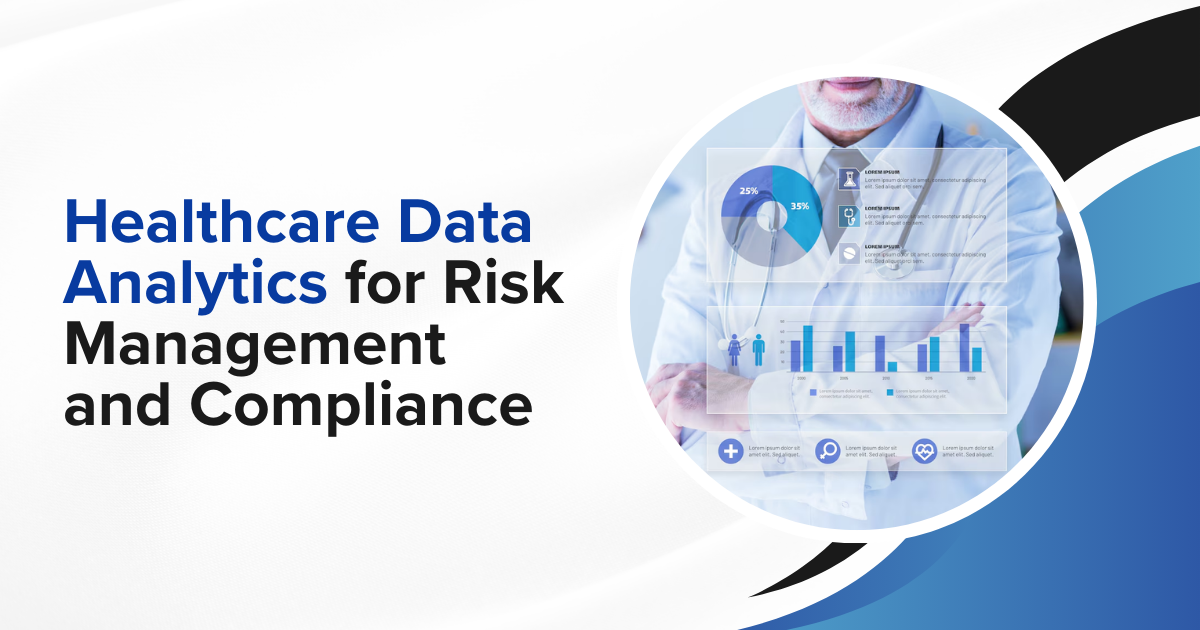Healthcare Data Analytics for Risk Management and Compliance

Strong 8k brings an ultra-HD IPTV experience to your living room and your pocket.
The healthcare industry is increasingly relying on data to improve patient outcomes, optimize operational processes, and ensure compliance with regulations. Healthcare Data Analytics Solutions have become a key tool in managing risks and ensuring adherence to complex healthcare regulations. These solutions enable healthcare organizations to process vast amounts of data, identify potential risks, and take proactive measures to mitigate those risks.
In this article, we explore how Healthcare Data Analytics Services can be applied for effective risk management and compliance. We will examine the role of healthcare analytics in improving patient safety, managing financial risks, ensuring regulatory compliance, and addressing other industry challenges.
Understanding Healthcare Data Analytics
1. What is Healthcare Data Analytics?
Healthcare Data Analytics refers to the process of collecting, processing, and analyzing healthcare-related data to extract valuable insights that support decision-making. The data used in healthcare analytics comes from various sources, including electronic health records (EHR), insurance claims, patient surveys, lab reports, and more.
The goal of healthcare data analytics is to improve patient care, enhance operational efficiency, reduce costs, and minimize risks. Through data-driven insights, healthcare providers can predict outcomes, identify trends, and make informed decisions to optimize the quality of care and comply with healthcare regulations.
2. Types of Healthcare Data Analytics
Descriptive Analytics: This type focuses on understanding historical data to identify trends and patterns. For example, analyzing hospital admission rates over the past year to identify peak periods.
Predictive Analytics: This involves using historical data to forecast future outcomes. For instance, predicting which patients are at higher risk of readmission or developing certain conditions.
Prescriptive Analytics: This provides actionable recommendations based on data insights. It may suggest which treatments or interventions are most likely to improve patient outcomes or reduce risks.
The Role of Healthcare Data Analytics in Risk Management
1. Identifying and Mitigating Patient Safety Risks
Patient safety is a critical area where healthcare data analytics plays a vital role. Hospitals and clinics generate massive amounts of patient data, and analyzing this data can help identify potential risks to patient safety. For example, predictive analytics can assess a patient’s medical history and current condition to predict the likelihood of adverse events like medication errors, falls, or infections.
Example: Preventing Readmissions: By analyzing historical data, healthcare providers can identify patients at high risk of readmission. For instance, if a patient has multiple chronic conditions and a history of frequent hospital visits, predictive analytics can flag them as high-risk, allowing healthcare teams to provide targeted interventions and reduce the likelihood of readmission.
2. Enhancing Financial Risk Management
Financial risks are a constant concern for healthcare providers, especially with the rising costs of care and the complexity of insurance reimbursement systems. Healthcare organizations can use data analytics to manage financial risks by identifying fraud, improving billing accuracy, and optimizing resource allocation.
Example: Fraud Detection: By analyzing claims data and identifying inconsistencies or unusual patterns, healthcare data analytics can help detect fraudulent activities. For example, healthcare providers may uncover discrepancies in billing codes, or identify cases of overbilling or unnecessary treatments, which helps prevent financial losses.
3. Optimizing Operational Risks
Operational risks in healthcare include challenges such as inefficient resource utilization, delays in patient care, and scheduling issues. Healthcare data analytics can be used to optimize workflows, improve patient flow, and reduce operational inefficiencies.
Example: Emergency Room Wait Times: Using predictive analytics, hospitals can predict peak hours in the emergency room and adjust staffing levels accordingly to reduce wait times. This leads to improved patient satisfaction and better operational efficiency.
Healthcare Data Analytics for Compliance Management
1. Understanding Healthcare Regulations
Healthcare providers are required to adhere to a range of regulations, including HIPAA (Health Insurance Portability and Accountability Act), the Affordable Care Act (ACA), and various state-specific laws. Compliance with these regulations is essential to avoid legal penalties, protect patient privacy, and maintain operational credibility.
HIPAA Compliance: One of the most significant regulatory challenges in healthcare is protecting patient privacy. Healthcare organizations must ensure that they manage and protect patient data in compliance with HIPAA. Non-compliance can lead to severe penalties and reputational damage.
MACRA and MIPS: The Medicare Access and CHIP Reauthorization Act (MACRA) established a new payment model for healthcare providers based on value rather than volume. Healthcare organizations must collect and analyze data on performance measures to ensure compliance with MACRA and meet the Merit-Based Incentive Payment System (MIPS) criteria.
2. How Healthcare Data Analytics Supports Compliance
Healthcare data analytics plays a critical role in ensuring compliance by automating processes, monitoring activities, and providing real-time insights. Here’s how:
Data Auditing and Monitoring: Data analytics solutions can track and monitor healthcare activities, such as medication prescriptions, treatment plans, and billing procedures, to ensure they align with regulatory requirements.
Ensuring Data Security: With the increased risk of data breaches, especially involving sensitive health information, healthcare data analytics solutions help monitor systems for vulnerabilities and flag any potential security risks. For example, detecting unauthorized access to patient records or identifying patterns of phishing attacks.
Generating Compliance Reports: Healthcare providers need to submit periodic reports to regulatory bodies to prove their compliance. Data analytics tools can automatically generate these reports based on real-time data, reducing the administrative burden and ensuring accurate reporting.
Example: Electronic Health Records (EHR): By leveraging analytics on EHR data, healthcare organizations can ensure that their documentation is complete, up-to-date, and in line with regulatory requirements. This not only supports compliance but also improves patient care by having accurate and accessible patient records.
Benefits of Healthcare Data Analytics Solutions
1. Improved Patient Outcomes
By utilizing Healthcare Data Analytics Solutions, healthcare providers can gain a deeper understanding of patient needs and treatment effectiveness. Predictive analytics allows for the identification of high-risk patients, ensuring that appropriate interventions are made early, which can ultimately improve patient outcomes.
Stats:
According to a 2019 report by McKinsey, hospitals that implement data-driven decision-making have seen a 15% improvement in patient outcomes due to more targeted and timely interventions.
2. Increased Operational Efficiency
Healthcare data analytics can significantly reduce operational inefficiencies by optimizing workflows, improving staff allocation, and identifying bottlenecks in patient care processes. This leads to better resource utilization and faster delivery of services.
Example: Reducing Hospital Readmission: By analyzing patient discharge data, hospitals can identify the factors that contribute to readmissions and design preventive programs to reduce these events, leading to lower costs and improved patient satisfaction.
3. Cost Reduction
With predictive analytics, healthcare organizations can forecast future needs, such as resource utilization, staffing, and treatment requirements. This allows them to allocate resources more efficiently, avoiding unnecessary expenditures and reducing overall operational costs.
Example: Cost Savings in Medication Management: Analytics can predict which medications are most likely to be prescribed for certain conditions, allowing hospitals to stock the most common drugs, reducing waste, and ensuring that medications are always available.
4. Better Decision-Making
Healthcare data analytics offers real-time access to critical data, empowering healthcare providers to make informed decisions. With the ability to analyze both structured and unstructured data, healthcare professionals can better diagnose, treat, and manage patients.
Example: Predicting Disease Outbreaks: By analyzing patterns in public health data, healthcare providers can predict disease outbreaks and take early preventive measures to minimize the impact on patients and communities.
Healthcare Data Analytics Services: Why You Need Them
While healthcare data analytics solutions provide great benefits, implementing and managing these systems can be complex. Many healthcare organizations lack the technical expertise and resources to handle advanced analytics. This is where Healthcare Data Analytics Services come into play.
Key Services Provided by Healthcare Analytics Providers
Data Integration: Healthcare organizations often struggle with integrating data from multiple systems (EHRs, billing software, claims data). Data analytics services help consolidate this data into a unified platform for analysis.
Customized Analytics Solutions: Analytics providers design custom solutions tailored to specific healthcare needs. Whether it’s improving patient care or managing risks, these services ensure that analytics tools are designed to meet the unique requirements of healthcare providers.
Continuous Monitoring: Healthcare data analytics services provide ongoing monitoring of systems to ensure compliance with changing regulations and detect any anomalies or risks in real-time.
Expert Training and Support: Healthcare organizations may require training on how to use analytics tools effectively. Data analytics service providers offer training and ongoing support to ensure healthcare professionals can leverage data insights properly.
Example: Cognizant offers a suite of Healthcare Data Analytics Services that assist healthcare organizations in improving patient outcomes, optimizing operational efficiency, and ensuring compliance with regulations like HIPAA.
Conclusion
Healthcare Data Analytics Solutions and Healthcare Data Analytics Services are essential tools for managing risks, improving patient care, and ensuring compliance in an increasingly complex healthcare environment. By leveraging the power of data, healthcare organizations can predict and mitigate risks, optimize operations, reduce costs, and ultimately provide better care to their patients.
As healthcare continues to embrace digital transformation, the role of data analytics will only grow. By adopting the right data analytics solutions and working with skilled analytics service providers, healthcare organizations can achieve better outcomes, maintain compliance, and enhance the quality of care for patients across the globe.
Note: IndiBlogHub features both user-submitted and editorial content. We do not verify third-party contributions. Read our Disclaimer and Privacy Policyfor details.







